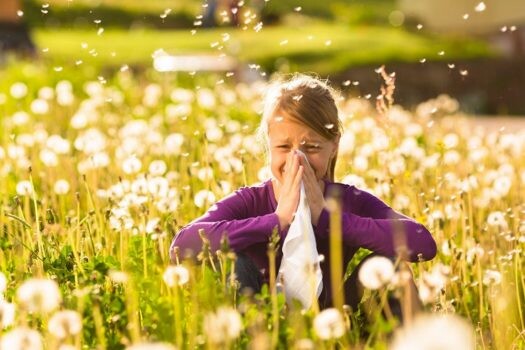
It’s getting to be that time of year! I love to be outside in the spring and summer and I am so thankful that I’ve never had to deal with allergies, but I know many people who do. Spring and warmer weather often cause itchy, watery eyes, runny noses, and sneezing, also commonly called hay fever. These symptoms are a result of a rise in histamines in the environment which can come from many sources.
Besides pollen, pet dander, dust or mold, histamines can also be released in the body through intestinal Dysbiosis, stress, foods naturally high in histamine, or fermented food and alcohol. Food allergies are often due to the presence of candida Albicans or other infections that cause “leaky gut syndrome”. Chemicals in foods and improper diet also commonly cause food reactions and can damage the intestines.
Histamines can be at the root cause of many health issues, and the cause of these symptoms is often hard to identify. Headaches, migraines, asthma, difficulty sleeping, nasal congestion, hives, itching or rashes, premenstrual cramps, abnormal menstrual cycle, fatigue, racing heart or palpitations, dizziness, and intestinal bloating, gas or diarrhea are just a few of the body systems affected by high levels of histamines. Today, we will focus more on allergies and the things that can cause them.
Allergies or allergic reactions are reactions in the body due to exposure to airborne particles, foods, water, molds, dust, chemicals, pollens and other substances that can act as a “foreign object” in the body. The body then produces antibodies to neutralize or help rid the body of the foreign substance.
In the process, histamine and other chemicals are released which cause allergic symptoms. Often, allergic symptoms are good, in that the body is trying to get rid of the offending substance. Sneezing or coughing when you breathe dust, for example, is a normal reaction of the body. If, however, the normal defense mechanisms malfunction or become extra-sensitive, the reaction can become prolonged or excessive.
Allergies & The Adrenals
One of the body’s defense mechanisms to regulate allergic reactions is the release of cortisone, adrenalin (epinephrine) and other chemicals from the adrenal glands. When the adrenals are fatigued, it is harder for them to produce the additional amounts of cortisol necessary to effectively counteract the inflammatory allergic reactions. People going through times of adrenal fatigue (or excess stress or burnout) may notice that they seem to have more allergies or their allergies seem to get worse.
On the other hand, the more histamine released, the harder the adrenals have to work to produce enough cortisol and the more fatigued they may become. So, it’s not surprising that people with food and environmental allergies commonly tend to experience adrenal fatigue as well. This can set up a cycle of reduced cortisol allowing histamine to inflame the tissues more, leading to deepening adrenal fatigue as well as to bigger allergic reactions.
Toxic Metals & Toxic Chemicals
Although the adrenal glands are often involved, toxic metals and toxic chemicals can also cause allergic reactions. BPAs, pesticides, herbicides, and genetically modified organisms (GMO) foods as well as food additives, preservatives, and colorings can all act to increase histamine levels resulting in allergies or allergic reactions.
In addition to environmental toxins, most people produce toxins in their gut due to inadequate digestive juices or improper diet. For example, protein foods that are not digested actually rot or putrefy in the intestines. These produce very toxic substances that are absorbed into the liver.
Another source of toxicity in some instances are toxins caused by chronic infections. These produce what are called endotoxins and/or exotoxins. Common sites of acute and chronic infections include the ears, teeth, sinuses, throat, bronchial tubes and many more. Some of the symptoms of an infection can be the body’s reactions to these toxins. Chronic infections such as candida Albicans, infected teeth, ear, or sinus infections weaken the body and must be eliminated to stop some allergies. Reacting to all these sources of toxins also contributes to adrenal exhaustion over time.
Allergies And Cell Permeability
Another cause of allergies is excessive permeability of the intestines and other cells as well. Permeability means the ease with which chemicals can pass in and out. If the cells are too permeable, foreign substances can enter and cause severe allergies. This can present itself in the form of skin reactions such as hives, dermatitis, eczema and other skin problems, especially in the very young. They may also have food allergies; although these can be due to the excessive permeability of the intestinal lining, also called leaky gut.
Food Allergies
Reactions to foods are very common and can have a variety of causes. We have already discussed imbalanced adrenal glands, excessive cell permeability and the presence of toxins. However, food reactions can also be due to the very nutrients or other chemicals in the food. The poor nutrient content of the food itself can sometimes seriously unbalance the body chemistry, leading to powerful reactions.
Eliminating allergic foods from the diet often helps to reduce all allergies. The most common offenders are wheat, cow’s milk dairy, sugar in all forms, and chemical laden foods. Symptoms may range from skin rashes, flaring of infections, headaches, cramps, fatigue, depression and many others, along with the usual symptoms commonly associated with allergies.
Most people benefit from better quality food, better eating habits, and digestive enzymes to help balance body chemistry. A vicious cycle often occurs in which impaired digestion causes reduced nutrient absorption, which in turn causes even worse digestive problems. Rotating foods every 3-4 days to ensure sufficient variety in the diet can also help reduce allergic reactions. A Balanced Healthy Living Program is especially helpful in balancing body chemistry and restoring body systems, which is important to eliminating allergies.
What To Do About Allergies
Over-the-counter and prescription medications may suppress the symptoms of allergies, however, they do not address the deeper causes. They may also have harmful side effects and do not reverse nutrient deficiencies and metal toxicity.
Rebuilding health starts with a hair mineral analysis to assess body chemistry and guide the design of a nutrition, detoxification, lifestyle, and supplementation program. It takes more work and time than just using remedies, but when done correctly gives long-lasting results. If one is willing to take these steps, most allergy problems can be greatly improved. It also offers many healthy ‘side effects’ such as improved energy and resistance to many illnesses.
The goal of rebuilding health is to replenish thirty to forty different nutrients, improve circulation, reduce the load of toxic metals and eliminate chronic infections in the body. It involves balancing the activity of the adrenal and thyroid glands which produce the anti-inflammatory (anti-allergic) corticosteroid hormones.
Nutritional remedies help strengthen the adrenal glands, reduce cell permeability and balance body chemistry. All of these are important in getting rid of allergies, but in addition, there are a number of other things you can do.
- Reduce your stress level – Stress can cause an increased response of histamines in the body so reducing stress usually helps allergies a lot. Stress may come from any sources from either inside or outside the body. When it reaches a certain level, the adrenals can no longer respond properly, and allergies result.
- Check your lifestyle – Are you getting enough sleep and rest? Most allergy sufferers are tired, and fatigue often indicates that your adrenal glands are not working properly. Plenty of relaxation and rest in a clean, well-ventilated area helps reduce stress and fatigue.
- Move your body – Moderate exercise and deep breathing may be helpful, but excessive exercise weakens the adrenals and eventually makes allergies and asthma worse. Running or bicycling along heavily traveled roads may seem healthy but exposes people to harmful exhaust fumes. This doesn’t mean you have to go to the gym, either – taking a brisk walk gets your heart pumping helps move toxins through the body to be disposed of through the various detoxification pathways.
- Watch what you think – Emotions have powerful effects on the body. Fear, worry, anger and other negative emotions add stress while positive, inspiring, uplifting thoughts reduce stress.
- Use essential oils – Essential oils can play a big part in supporting the different body systems. Applied topically or inhaled, some can relieve the external symptoms of allergies; as well as supporting the internal organs. Others can be diffused to provide a more positive, peaceful atmosphere. Still others can be used when cleaning to avoid putting more toxins into your environment.
If you always do what you’ve always done, you’ll always get what you’ve always got. – Henry Ford, Founder of Ford Motor Company
Now What?
So, after reading all this, what do you think? Is it time to do something different this allergy season? Is it time to take a different approach? An approach that will not only help your allergies but also help balance your overall body chemistry and help heal so many other things as well? If you have questions about how a nutritional balancing program can help rebuild your health and even improve your allergies, please schedule a complimentary call.
Disclaimer: The information contained herein is not to be construed as medical advice and is not intended to diagnose, treat, or cure any medical condition. These statements made have not been approved by the FDA, nor should they be taken as a substitute for medical advice from a licensed physician.
Affiliate Links: Some links on my website and emails are affiliate links. Should you click on these links and decide to purchase anything, I will receive a small commission and you will have my sincere thanks for supporting Tina’s Healthy Living.












